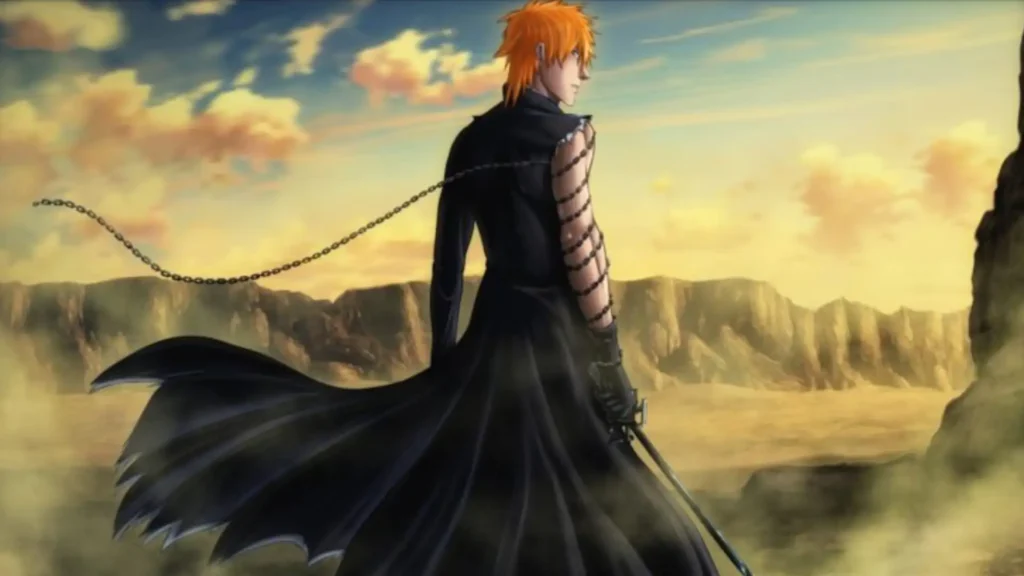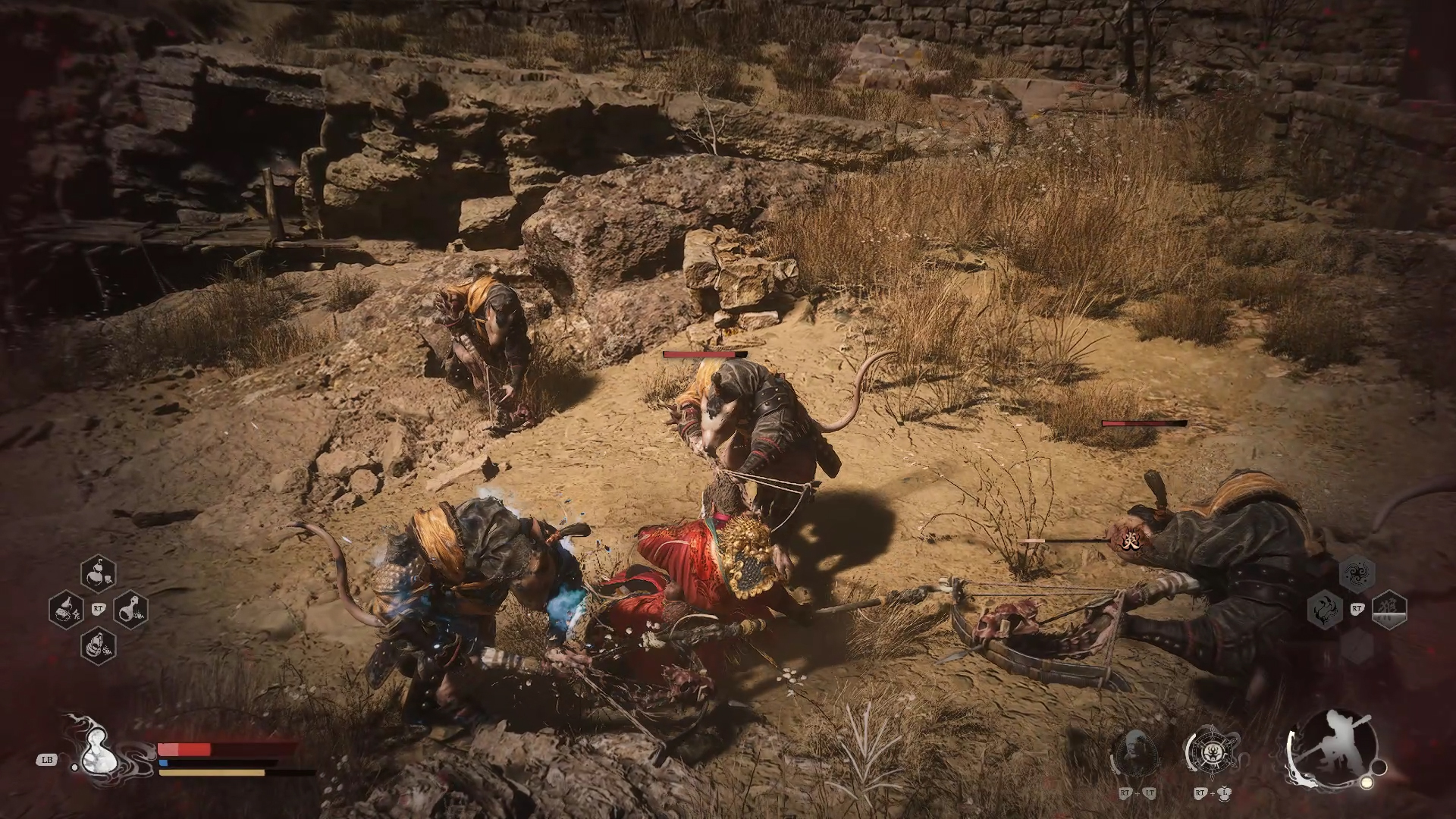Black Myth: Wukong Story Explanation
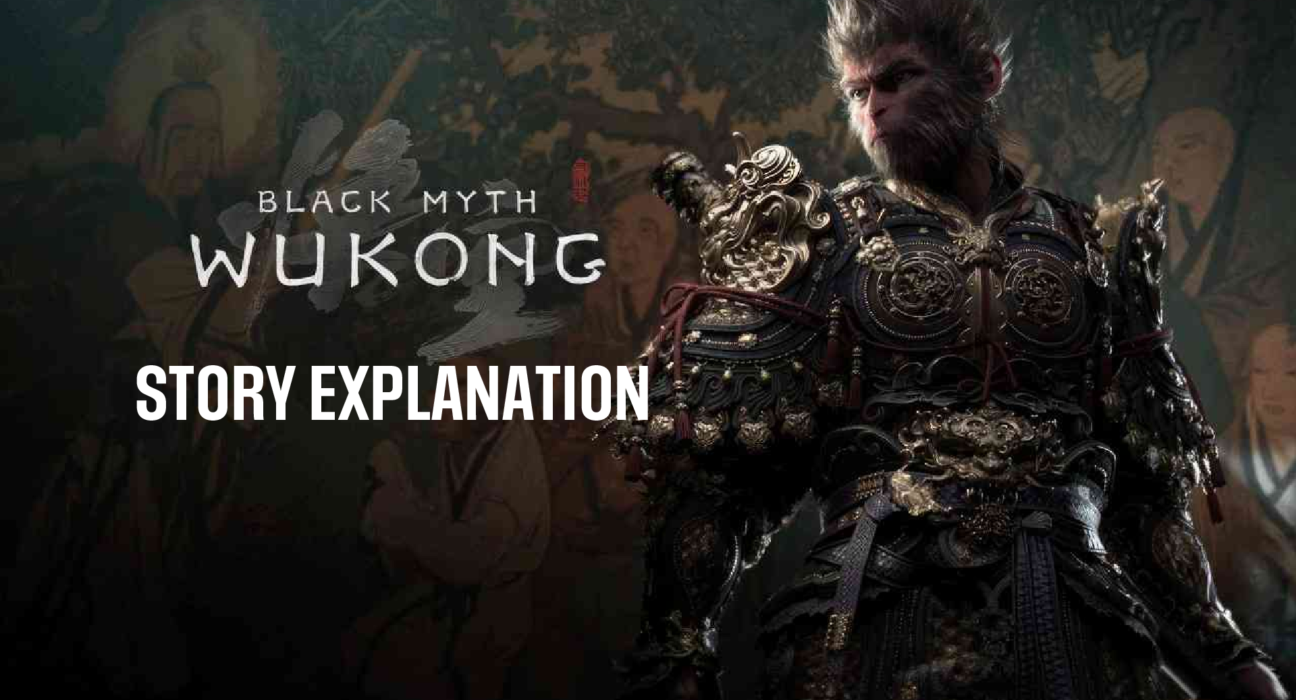
Every legend begins with a spark, and Black Myth: Wukong rises from one of the brightest fires in Chinese literature. Inspired by the timeless epic Journey to the West, the game does not simply retell an old story. Instead, it dares to imagine what comes after, crafting a world where myth is fractured and glory lies buried beneath dust and memory.
At the centre of this tale stands Sun Wukong, the Monkey King. Trickster, rebel, immortal warrior, and unwilling sage. His shadow stretches across centuries of storytelling, yet in this reimagined world, he is no longer the unstoppable hero we once knew. His power lies scattered, his legacy incomplete, and his fate bound to relics hidden across treacherous lands.
Into this silence steps the Destined One. You are not the Monkey King, but a seeker of truth and strength. With staff in hand and courage untested, you are drawn into a journey where every step reveals echoes of the past and trials of the present. The relics you pursue are more than artefacts. They are keys to remembrance, fragments of a fallen god, and perhaps, mirrors of yourself.
The story of Black Myth: Wukong is therefore not just about reviving a hero. It is about confronting the weight of legend. It is about asking whether glory can be restored, or whether new myths must be forged in its place. This is the beginning of that Journey, the opening of a path where myth and destiny collide.
Table of Contents
Birth of Monkey King
Before stepping into the game itself, it is necessary to look back at the origins of Sun Wukong, for no tale of Black Myth: Wukong can be understood without him. Unlike other beings who came into the world through flesh and blood, Wukong was born from stone. His very existence was an act of defiance against the natural order. From the first moment, he displayed a mind sharper than most mortals, mastering languages, skills, and secrets that others could not hope to grasp.
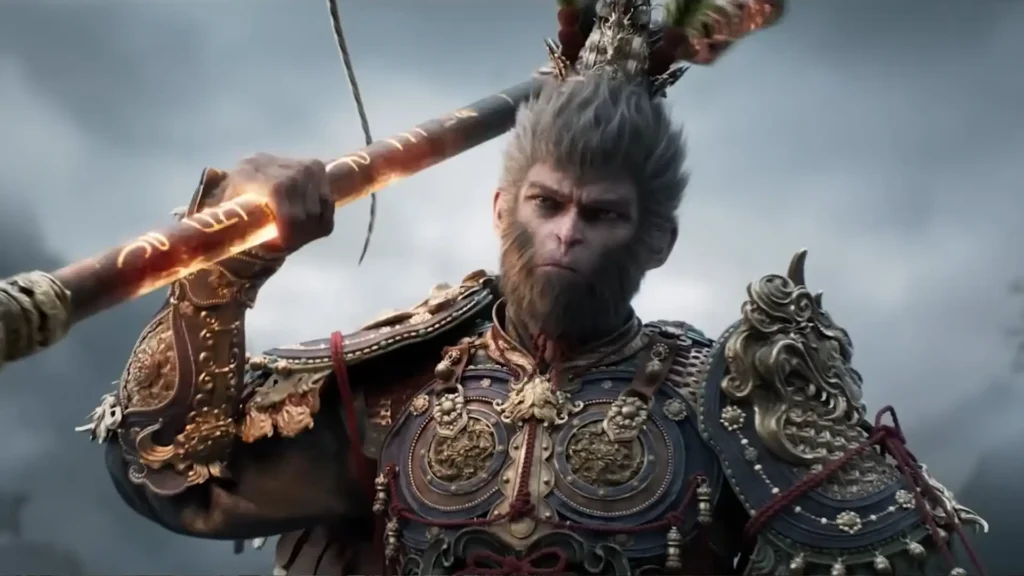
In his relentless pursuit of knowledge, he even discovered the paths to immortality, and not merely once, but many times over. Each triumph deepened the unease of the Celestial Court, a gathering of gods and spirits in the heavens, who could not abide that a mere stone monkey should wield such divine strength. They confronted him with armies and decrees, but in the end, they could not destroy him. Instead, they bound him beneath a mountain, sealing him away for five centuries.
Yet fate is rarely so simple. In time, a monk named Xuanzang, remembered in the game as Tang Monk, was chosen for a holy pilgrimage: to journey westward and bring back sacred scriptures from the heavenly lands. His mission was noble, but his body frail, and so he sought companions to shield him from the dangers that lay ahead. It was during this quest that he encountered the imprisoned Monkey King.
Their alliance was never one of equals. Tang Monk carried with him a cursed circlet, a device of celestial design that could tighten around Wukong’s head at the sound of a spell, inflicting unbearable pain. With this cruel bond, the once-proud monkey was forced into service. He became both protector and prisoner, disciple and enslaved person, bound to escort the monk across mountains, rivers, and endless trials.
Thus began their Journey together, a pilgrimage remembered as one of the most celebrated sagas in Chinese lore: the Journey to the West. Alongside Tang Monk and other companions, Wukong would face demons, gods, and trials that tested not only his strength but also his spirit.
Only after these events does Black Myth: Wukong take root, carrying us beyond the known pages of legend into a new imagining of what followed.
The fall of a Monkey King
The game opens with the player embodying Sun Wukong himself, stepping into battle against towering figures that resemble gods, giants, and spirits of immense power. The world unfolds in dazzling beauty, the skies alive with colour, and the landscapes shimmering with the fidelity of a myth brought to life. Clouds swirl into vast arenas, where armies gather like shadows of ritual, their faces hidden behind masks shaped like birds of omen. Spears are raised, chants echo, and all eyes turn to the lone figure of the Monkey King.
From the first clash, the game reveals its heart. This is not simply combat; it is a story through struggle. Wukong faces not only the celestial armies but a force greater than most. Erlang Shen, the sacred divinity known in Chinese legend for the third eye upon his brow, an eye said to pierce through all illusions. In this retelling, Erlang descends as both judge and executioner, standing as the unyielding might of heaven against the rebellious stone-born monkey.
The duel that follows is fierce and unrelenting. Wukong, in his defiance, taunts and resists, even attempting to shift the battle into the forest below, where shadows might veil him. He transforms into a bird, seeking the ground of his choosing. Yet Erlang does not yield, and in the end, the Monkey King is overcome. Bound by celestial power, beaten by fate, he is stripped of defiance and returns once more to stone.
But the story does not end with defeat. In the quiet aftermath, an aged monkey sage approaches the player, a figure of wisdom cloaked in mystery. Here, the mantle shifts. The player is no longer Sun Wukong, but the Destined One, a wanderer who carries his likeness, a reflection of his spirit. Guided by the old monkey’s words, the path becomes clear: seek the Six Relics, fragments of the Great Sage’s essence scattered across the land. Only by gathering them and returning to Mount Huaguo may the stone-bound Monkey King rise again.
Thus the journey begins, not as the legendary Sun Wukong, but as his shadow, his successor, his chance at renewal. The tale of Black Myth: Wukong becomes a bridge between past and future, between the immortal hero we once knew and the uncertain figure we now become. To follow this path westward is to walk into myth itself, carrying not only a staff but the burden of a fallen god.
Chapter One: The Greed of Elder Jinchi
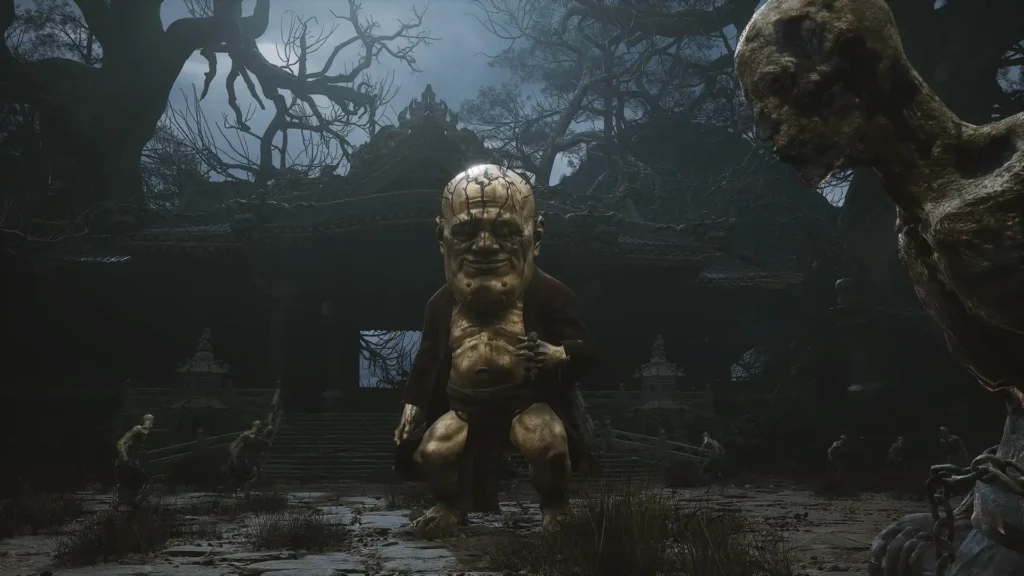
Long before the journey of the Destined One, legends whisper of a monk named Jinchi. As a child, wandering alone through a dark forest, he encountered a black bear of immense size and strange power. The beast offered him gifts of wealth, sowing within the boy the seed of greed. Though Jinchi grew to join the monks of Guan Temple, rising in age and stature until he was called Elder Jinchi, the shadow of that greed never left him. His life became a strange devotion, not to wisdom or scripture, but to possessions. Most curiously, to the sacred monk robes known as kasayas.
Around the same region lay Black Wind Mountain, a land thick with wolves, serpents, and spirits. Among the wolves was a frail figure named Guangzhi, who longed to abandon his wild form and live among men. The black bear, whose influence spread like a curse, granted him the guise of a human so he might dwell within the temple society. But where wolves prowled, snakes soon slithered. Rivalry between the clans ran deep, and so the serpents sent forth Wang Mao, one of their own, to outshine Guangzhi in the eyes of Elder Jinchi and claim favour.
Years passed until fate carried Tang Monk and his disciple, Sun Wukong, to Guan Temple. They sought only passage, but Elder Jinchi’s gaze fixed upon their kasaya, a robe of rare sanctity. His obsession consumed him. The black bear whispered schemes, and both Guangzhi and Wang Mao conspired to win Jinchi’s approval by stealing it. What began as a theft soon darkened into a plot of fire and ruin.
Wang Mao proposed burning Tang Monk and Wukong so that the robe could never be reclaimed. Jinchi, enthralled by the promise of possession, agreed. Yet when the flames were unleashed, they did not consume the travellers. Instead, the fire devoured Guan Temple itself, reducing sacred halls to ash. The monks perished, and Elder Jinchi, consumed by despair and the weight of his obsession, ended his own life.
From that moment, the temple lay in ruin, and the wolves and serpents who had plotted for favour returned to the mountains, carrying with them guilt and enmity. The tale of Elder Jinchi became less a story of faith than of corruption, a warning of how greed could twist even the most sacred of paths.
Thus begins the tapestry of Black Myth: Wukong, not with the rise of a hero, but with the fall of those who allowed desire to eclipse their devotion.
Chapter Two: The Kingdom of Flowing Sand
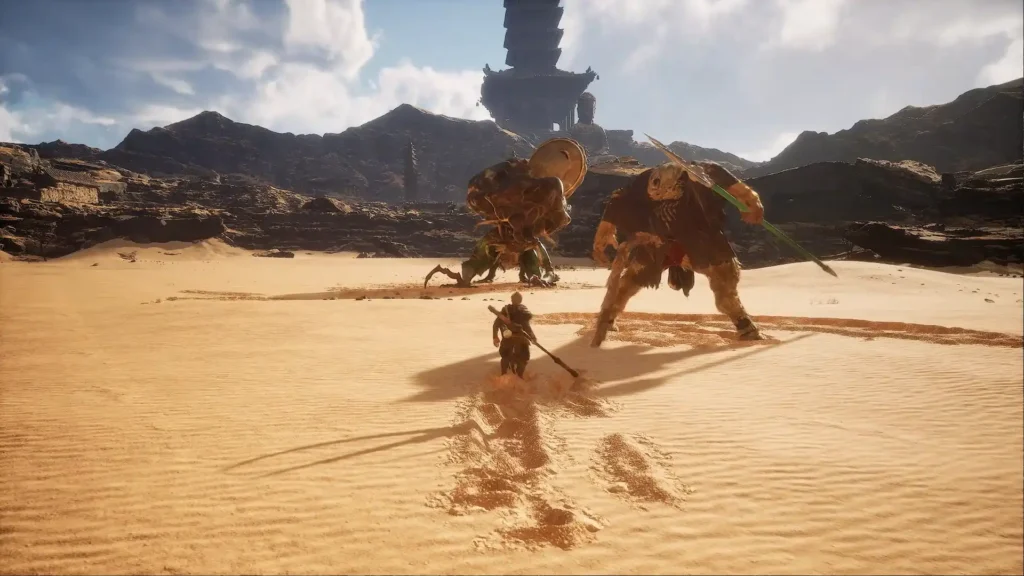
Far to the west lay the Kingdom of Flowing Sand, a desert realm unlike any other. Its people lived beneath a sky both sacred and perilous, for each evening the sun itself seemed to descend into the western ocean, sending violent vibrations through the earth. The tremors shook walls, broke vessels, and even threatened the lives of infants. In desperation, the people turned to their faith, and their devotion to the Buddha was rewarded. A divine drum was bestowed upon them, a sacred instrument whose resonant strikes quelled the chaos of the setting sun.
For a time, the kingdom thrived. Yet the heart of its ruler darkened. As the people’s love for Buddha grew, the king’s pride grew restless. No longer able to bear sharing reverence with a higher power, he decreed that the Buddha’s name should be silenced. The divine drum, once a symbol of salvation, answered this arrogance with disaster. When struck again, it did not still the sun’s fury but summoned forth a monstrous black beetle that erupted from the sands, devouring villages and slaughtering innocents.
Amidst despair, salvation came from an unexpected figure: a monk of rat-like form, clad in saffron robes, whose cunning seemed equal to his devotion. He led the armies of the kingdom against the beetle and struck it down. In gratitude, the king raised him to high honour, bestowing the title of Royal Sage. Yet in victory lay the seeds of corruption. The Sage whispered in the king’s ear, feeding his pride while exalting the worth of rats. Under his influence, the king enacted the Rodent Reverence Edict, welcoming rat-folk into the city and punishing anyone who resisted.
This decree divided the royal house. One son fled, another obeyed without question, while the eldest bristled against such madness. His defiance ended in chains, for to oppose the Royal Sage was to oppose the throne itself. Still, the Sage’s ambition grew. It is said that through his dark arts, the king and his people were transformed, their human forms shed until the entire kingdom became a nation of rats. Having reshaped the land, the Sage abandoned it, taking with him both followers and secrets.
He wandered into Yellow Wind Ridge, where he became a disciple of a bodhisattva and later seized power of his own. Taking the name Yellow Wind King, he commanded armies and ruled the desert with a hand both cunning and cruel. It was during this time that his Tiger Vanguard kidnapped Tang Monk, drawing the ire of Sun Wukong. The Monkey King defeated the tiger, scattered its line, and rescued his master, but the Yellow Wind King endured.
Years later, fate drew him into a deeper tale. From the ruins of Wukong’s transformation into stone, six relics were scattered across the world. One of these fell into the Yellow Wind King’s grasp. Legend holds that he even slew his own master, preserving the severed head as a vessel for the relic’s power. From that day forth, his dominion spread wider, his shadow lengthened, and the deserts of the west bowed to his name.
Chapter Three: The Philosophy of Yellow Brow
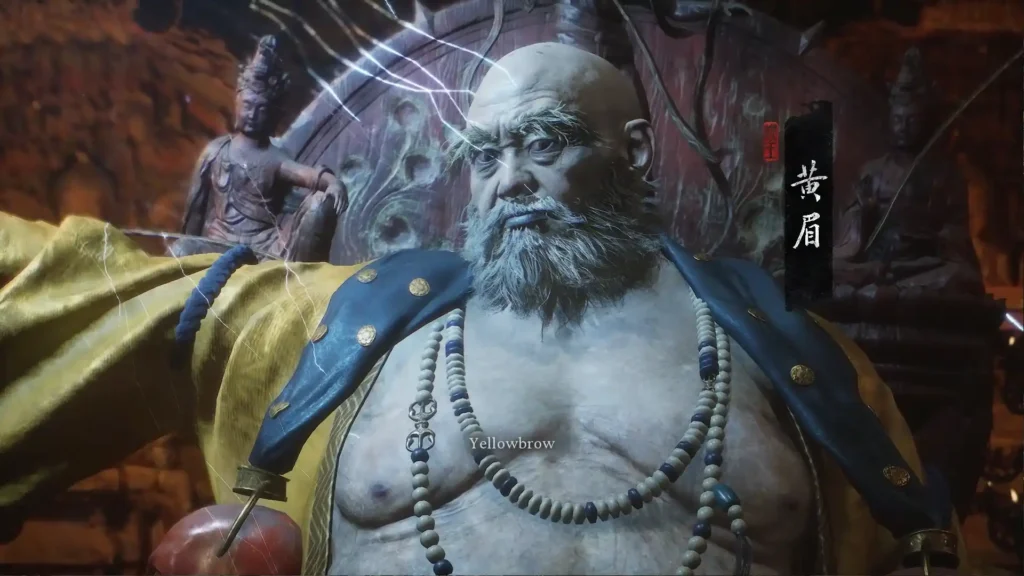
Beyond the desert sands of the Flowing Kingdom rose the mountains of the New West, a land of cold peaks and snow-laden valleys. Here dwelt a monk named Yellow Brow, whose restless spirit set him apart from his peers. While others pursued silence, devotion, and the relinquishing of desire, Yellow Brow pursued argument. He craved not only knowledge but victory in debate. His rival in thought was the monk Jin Chanzi, with whom he would spar endlessly over the very nature of truth.
To Jin Chanzi, truth was bound to suffering, for only through pain could one approach enlightenment. To Yellow Brow, truth lay in desire. He believed that joy and indulgence were as essential as sorrow, that pleasure and pain defined each other, and that to deny either was to deny truth itself. Their arguments thundered through the halls of their monastery until at last Yellow Brow sought to prove his doctrine. He transformed his body into a vessel of wealth, concealing within his flesh pearls and treasures that dazzled the eyes of mortals.
Cast upon the shore of a starving village, he revealed his riches, and desperation swiftly turned to frenzy. Men tore at one another, families collapsed into chaos, and the village was destroyed in greed and blood. In this ruin, Jin Chanzi returned, mourning not only for the people but for his companion, who had sacrificed wisdom for pride. Their final exchange was not a debate but a lament: truth had been twisted into a weapon, and victory had come at the cost of humanity.
Yet Yellow Brow’s ambition did not end there. He seized power from his master, whom legend remembers as the Melon Baby, and declared his philosophy supreme. Those who resisted were enslaved or slain. Even among the Celestial Court, some bent the knee, including a dragon maiden who surrendered her will to him. But not all could be swayed. The Third Prince of the Sand Kingdom, son of the very king once corrupted by the Royal Sage, marched with four captains to oppose him. Their defiance ended in tragedy. The captains were mutilated, and the prince, shamed by his failure, blinded and deafened himself, retreating into silence.
In time, Tang Monk’s pilgrimage led him into Yellow Brow’s domain. Here, the sage of indulgence ensnared the monk, drawing him into captivity. Sun Wukong, ever the protector, rose once more against tyranny, rescuing his master from Yellow Brow’s grasp. Their encounter would echo into later years, for when Wukong was at last bound in stone and his essence scattered into relics, Yellow Brow himself seized one. The relic’s power only deepened his dominion, adding to the long and troubling lineage of those touched by the colour of gold. First the Yellow Sage, and now the Yellow Brow.
The mountains of the New West remained haunted by his creed, a philosophy of desire elevated to law, echoing through snow and stone.
Chapter Four: The Webbed Hollow
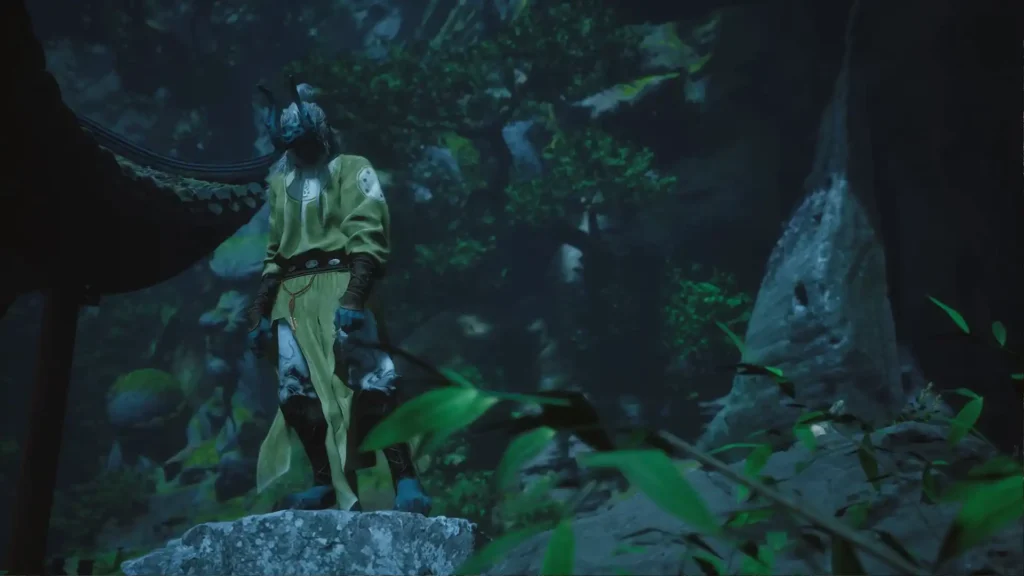
From the frozen peaks of the New West, the pilgrims pressed onward until they reached a forest thick with shadows, where webs hung like silver chains between the trees. This was the Webbed Hollow, a place haunted by sorrow and desire, and it is here that the tale of the spiders unfolds.
Tang Monk, wandering from the path, came upon a celestial spring. It was no longer sacred but had fallen into the hands of seven spider demons who wore the guise of maidens. Entranced, he lingered too long, and the women ensnared him in their silken trap. Word reached Sun Wukong, who, in his cunning, took the form of a bird. He spied upon the spiders as they bathed, and with a trickster’s hand, he stole their garments, leaving them powerless to flee without shame.
But the story of the Hollow was more than a simple battle between monk and demon. For Zhu Bajie, the pig-faced disciple, the sight of the spider women cut deep into memory. Once, before he fell from the Celestial Court, he had been an admiral of the heavens, proud and noble. In those days, he had loved a woman of violet eyes, a bond severed when he was cast from grace and cursed with the form of a beast. Now, among the spider demons, he recognised her. His lost beloved, transformed into something monstrous, yet still bearing the trace of the woman he had once adored.
Conflict tore at him. While Wukong urged decisive action, Bajie faltered. As the spiders fled, he struck down six with grim obedience, his blade silencing their laughter forever. But when he came to the seventh, the one with violet eyes, his hand trembled. Love and duty clashed, and he could not finish what fate demanded. She escaped, leaving him hollow, his heart tangled in grief.
Together with Wukong, Tang Monk, and Sandy, the pilgrims journeyed onward to the Temple of Yellow Flowers, where further trials awaited. Yet for Bajie, the Webbed Hollow was a wound that would never fully heal. It was a place where desire and devotion collided, where the silk of love became indistinguishable from the snare of illusion, and where the pilgrimage itself grew heavier with sorrow.
Chapter Five: The Flaming Mountains
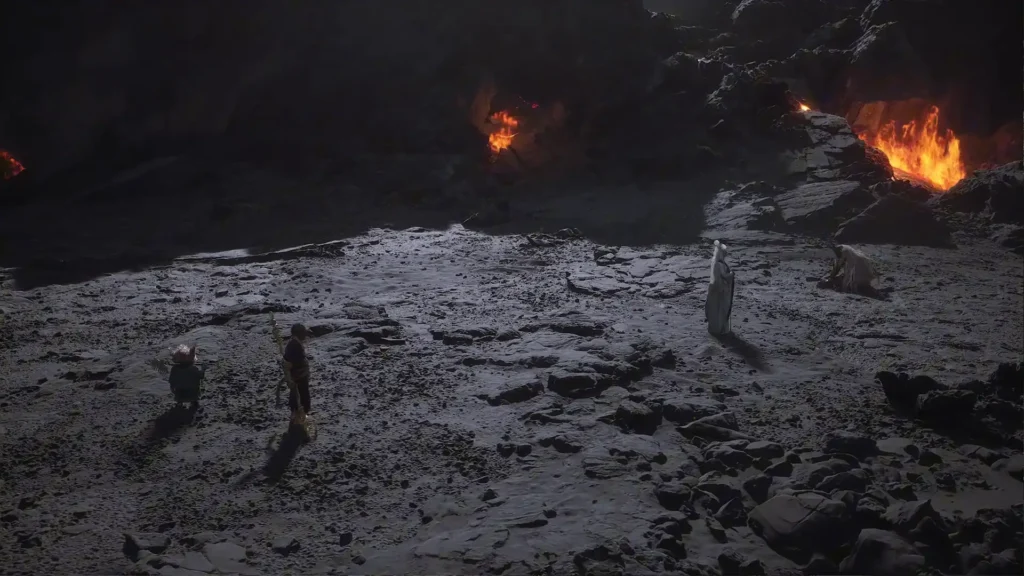
Long ago, fire rained from the heavens. Bricks of celestial flame fell from the Court above, striking the earth and giving birth to the Flaming Mountains, a land that burned without end. To keep this inferno in check, the Celestial Court cast down one of their own, a young attendant whose negligence had allowed the disaster to unfold. He was banished to serve as Keeper of the flames, guardian of a prison that stretched for miles in molten fury.
It was here that the Bull King ruled. A mighty yaoguai of immense strength, he held dominion over the mountains with his wife Rakshasi. Their family was tangled in myth as much as blood: a son, Red Boy, born after Rakshasi drank of a sacred river that made women fertile, and a daughter, Pingping, born of a fox princess whom the Bull King once courted. Their household was both powerful and fractured, a mirror of the world they governed.
When the pilgrims Tang Monk, Sun Wukong, Zhu Bajie, and Sandy reached the Flaming Mountains, they found their path blocked by the endless fire. Only one thing could part the flames: the Iron Fan, held by Rakshasi. Wukong, in his cunning, seized it. But theft breeds enmity, and the Bull King, who had once counted Wukong among his closest friends, now rose against him.
The battle that followed shattered more than stone. Amid the chaos, Bajie slew the fox princess, ending the life of the Bull King’s concubine and mother of Pingping. The Bull King’s grief twisted into rage. He grew vast, taking the form of a giant beast, his fury shaking the mountains themselves. Yet even his strength could not stand against the combined might of Wukong and the Celestial Court, who descended in force. The Bull King was struck down, his head severed, though his immortality allowed him to endure. At last, Rakshasi, broken and weary, surrendered the fan. With it, Wukong quelled the flames, and Tang Monk’s pilgrimage carried onward.
But the victory was hollow. In the ashes of battle lay the ruin of brotherhood. Wukong and the Bull King had once been bound by kinship, two rebels who had defied the heavens together, each yearning for freedom from celestial chains. In their final exchange, Wukong’s words cut deeper than any blade: Find someone to serve. It is the only way beings like us can survive. It was not cruelty but resignation, a bitter acknowledgement that defiance against heaven could never last.
The pilgrims moved forward, their mission fulfilled, yet Wukong’s triumph was laced with sorrow. For all his cunning and might, he had lost a friend to the will of the gods, and the fire of the Flaming Mountains left behind not only smoke and ruin, but a truth too heavy to ignore: the Court would never forgive him.
Chapter Six: The Fall of the Victorious Fighting Buddha
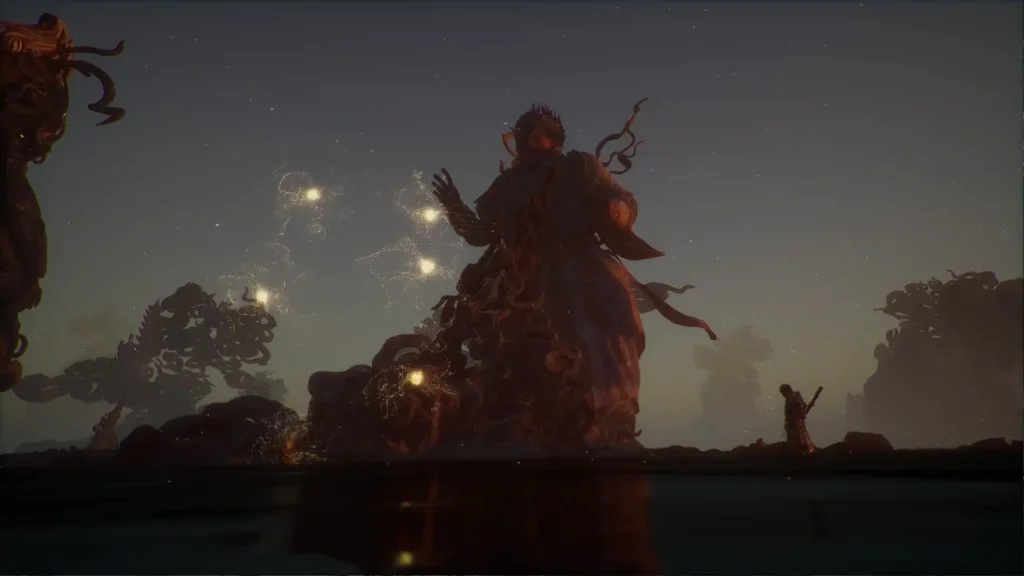
All roads lead back to the Monkey King. After completing his pilgrimage with Tang Monk, Sun Wukong achieved what few could imagine. He was granted immortality, his sins absolved, and the Celestial Court crowned him with the lofty title of the Victorious Fighting Buddha. His master’s scriptures had been delivered, his vows fulfilled. At last, it seemed, he might return to Mount Huaguo to live among his kin in peace, free from the chains of heaven.
But freedom was never truly his. The Celestial Court, still wary of his power, demanded his continued service. They wished not for his happiness, but for his obedience, so that they might keep watch upon the one creature who had defied heaven and lived. Wukong resisted. He had fought, he had bled, and he had bowed to their decree in order to protect his master and his friends. Yet now he longed only for freedom.
Among his rivals in heaven, there was one who understood. Erlang Shen, the god with the third eye. Their battles in ages past had forged respect, even kinship. And together they devised a final plan. Wukong could never truly escape so long as the enchanted circlet bound him. Even in victory, it was there, unseen yet present, tightening with the weight of heaven’s will. To sever himself from that shackle, he would have to die.
And so Wukong chose death. Before their secret duel, Erlang sealed Wukong’s memories within his divine eye. When the battle began, Wukong fell not in weakness but in sacrifice, surrendering to the fate that could free him. His body shattered into six fragments, relics of his essence scattered across the realms, carried into the hands of allies, enemies, and strangers alike. The Bull King, his old friend, was among those who bore the weight of this inheritance.
In his final moments, Wukong’s body returned to stone, as it had been before his miraculous birth. The Victorious Fighting Buddha, once feared and revered by gods and demons alike, became a silent rock once more. Centuries passed. The legends dimmed. Yet on Mount Huaguo, his descendants remained, waiting. Among them was an aged monkey, keeper of the old tales, who watched as the world shifted and the relics lay scattered.
Here begins your story. You are the Destined One, chosen not by heaven but by blood, by inheritance, and by fate. Within you burns one fragment of Wukong’s soul, his mind. Guided by the old monkey, you set forth to recover the remaining relics. Should they be gathered, the Great Sage Equal to Heaven may rise again, freed at last from the bonds that had cursed his existence.
Thus, the cycle closes, and the circle begins anew. The tale of Sun Wukong becomes the tale of another: YOU.






